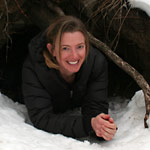Dr. Kristin Carden is the Associate Director for COMPASS, an organization that empowers scientists to engage in the public discourse about the environment. Prior to that, she worked as an associate attorney at Earthjustice in the Northern Rockies Office in Bozeman, MT. This profile describes her work at Earthjustice. An Ohio native, Kristin first ventured out West for college—and fell in love with the mountains, wildlife, and sense of wonder instilled by western landscapes. Her undergraduate studies in Wildlife & Fisheries Science at the University of Arizona led to several seasons with the National Park Service: studying brown bears at Katmai National Park in Alaska, and hawksbill sea turtles at Hawaiʻi Volcanoes National Park. She received her law degree from Harvard and her Ph.D. from the University of California, Santa Barbara’s Bren School of Environmental Science and Management.
A defiant sixth-grade girl stood at the entrance to her subdivision outside of Cleveland, Ohio, with posters that read “Tree killers.” As the landowners began cutting down the conifers she enjoyed every time she entered her neighborhood, Kristin Carden discovered at this early age her love for nature and her desire to protect our planet and its creatures through science-based advocacy and action.
In her work today at Earthjustice, Carden—both a scientist and an attorney—incorporates her scientific expertise into her conservation advocacy. Carden reflects, “At the end of the day, there’s nothing I’d rather be working on than trying to protect our national heritage, our wildlife, our wild oceans, our wild lands. It’s something that … has been a part of me since I was a young child and to be able to make a living doing what I love and what I care about is a huge gift.”
Saving our planet
After studying Wildlife and Fisheries Science at the University of Arizona, Carden had a variety of experiences in the field and in the lab that deepened her understanding of the relationship between science and policy. She studied brown bears in Alaska, researched hawksbill sea turtles in Hawaii, and examined the impact on marine mammals of a proposed aluminum smelter in coastal Chile. Observing wildlife up close motivated her to work to protect creatures that are fighting for survival.
After earning her law degree and holding two environmental law positions, Carden returned to graduate school to expand her scientific knowledge and perspective by studying sustainable fisheries management. At Earthjustice, she leverages both her science and policy expertise to protect the animals, lands, waters, and skies that inspired her earliest activism.
Ensuring that unconventional oil and gas drilling—hydraulic fracturing, or “fracking”—is handled responsibly was one of Carden’s first projects at Earthjustice. Environmental impact reviews of proposed oil and gas wells in northwestern Montana near the boundary of Glacier National Park were claiming that each individual well would not have a significant impact on the environment. But Carden realized that while one or two wells may not affect the air, water, or wildlife, the proposed 15 or 20 wells might, and that environmental impact reviews needed to be approached in a comprehensive study. Carden and her colleagues continue to monitor policies around fracking to ensure that energy development is done in a smarter and safer way.
Protecting grizzly bears in Yellowstone National Park is another Earthjustice project Carden is passionate about. Grizzly bears may soon be delisted as an endangered species, but questions remain about threats to their major food sources. “That’s a situation where I’ve been able to dig into the science,” she explains, “and work with scientists to try and develop policies and proposals and ideas on what is needed to foster grizzly bear recovery from a scientific perspective and what protections are needed from a legal perspective once these bears are taken off the list, if they are—what protections grizzlies need to make sure they don’t slide back toward extinction …. It’s … been a conversation with a lot of different stakeholders in the conservation community, the government, and various independent scientists trying to facilitate an outcome that’s best for the critters.”
Carden also continues to advocate for the protection of our planet outside the office through involvement in campaigns on a variety of environmental issues. An issue she follows closely is the Natural Resource Defense Council’s campaign to prevent the Pebble Mine in Alaska near Bristol Bay, close to where she did her field work on brown bears after college. “They’ve been wanting to mine Pebble for a very long time,” she says, “It’s personally very important to me. I think that particular area is a national treasure. It’s spectacular. It has an abundance of wildlife species and one of the world’s most accessible and sustainable salmon fisheries. It’s one of those special places that shouldn’t be mined … so I’ve tried to remain very engaged.”
A moral obligation
Although Carden is a strong proponent of informing conversations with scientific information, she notes that the public sphere has in some ways become hostile to science and that there is a perception that scientists compromise their objectivity by stepping into the policy realm. “I think there’s a way it can be done where you don’t necessarily have to state your position but can bring information to the table without becoming an advocate,” she observes.
However, Carden’s own persistence in science-based advocacy is driven by what she feels is a moral responsibility to bring her knowledge and perspectives to the table. She thinks many experts in conservation share this sentiment. She reflects about the opportunities she has had to fuse science with policy and advocacy: “So many of us that go into conservation biology do so because we believe … that there is a value in conserving nature and conserving wildlife and conserving special places. … I’ve been very fortunate with the jobs that I’ve had because they have enabled me to further that conservation.”
